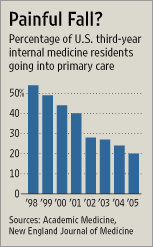DOCS ON STRIKE
Today’s NYT has another story on what seems to be an emerging trend: physicians going on strike to protest skyrocketing malpractice insurance costs. The arguments are predictable: the physicians blame evil trial lawyers and ridiculous jury awards while the lawyers claim they are sticking up for the little guys who get ramroded by money-grubbing doctors and penny-pinching HMOs. Ultimately, the doctors will prevail given that 1) their services are more obviously valuable and 2) “trial lawyer” has become an epithet. (Which is why John Edwards has zero chance of getting elected President, by the way.) Insurance reform, which would forbid insurance companies from charging doctors who have never been successfully sued outrageous premiums, may be the easiest way to solve this problem, but isn’t going to happen given the political power of their lobby. So the more likely result will be some sort of tort reform, which is already happening in many states, at the federal level. Indeed, President Bush called for this in last week’s State of the Union address. My guess is it will take the form of caps on punitive damages and pain-and-suffering awards, linking them to the amount of compensatory damage. My solution would be to simply ban outright the awarding of punitive damages. Civil law is designed to recoup monetary losses, not to sanction behavior. As a result, the burden of proof and rules of evidence are substantially looser than in criminal cases. I would make doctors (and corporations and everyone else, for that matter) liable for the financial costs of their negligent conduct in civil courts but would reserve the imposition of punishment to the criminal court system. This would not only result in the end of almost all of the insanely inflated judgments (which, granted, are often radically reduced on appeal) but it would end a lot of the silliest of lawsuits outright, as the ambulance chasing crowd would be a lot less eager to take frivilous cases on a contingency basis if there is little prospect of striking it rich on either the whims of one emotional jury or a blackmailed settlement based on fear of same.





